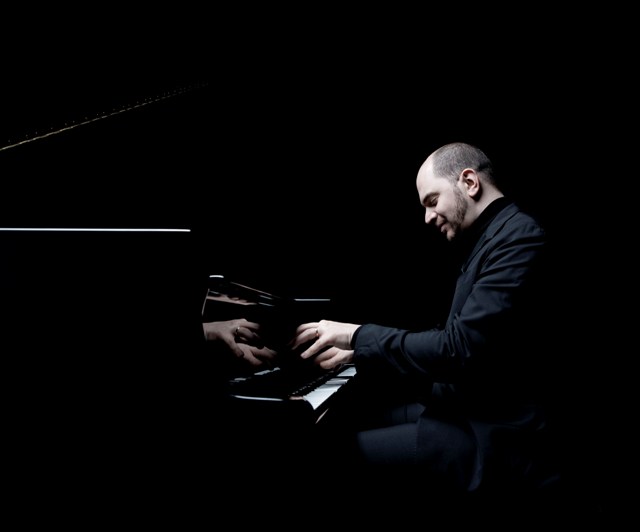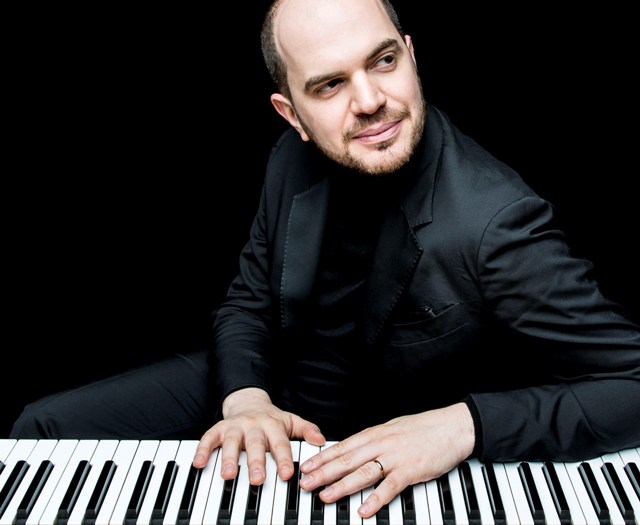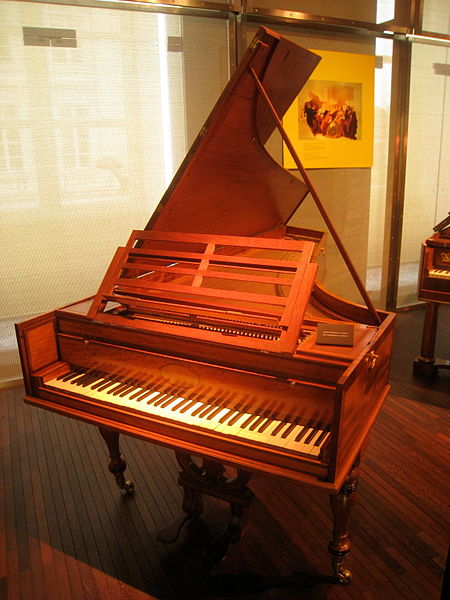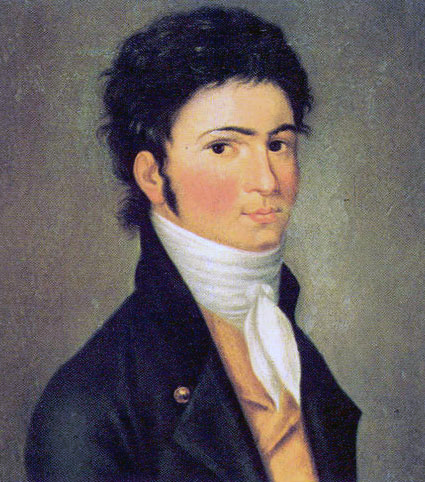With a recital beyond ambitious, series opens celebrating Beethoven’s 32 piano sonatas

Kirill Gerstein launched the ambitious Symphony Center Presents “Beethoven 250” series with five early sonatas and a humongous encore. (Gerstein photos by Marco Borggreve)
Review: Pianist Kirill Gerstein played the opening recital in the Beethoven 250 sonata series at Symphony Center.
By Nancy Malitz
Hard to know if it was in the spirit of the Chicago Marathon or what, but the Russian-American pianist Kirill Gerstein opened the Chicago Symphony Center’s nine-part season-long Beethoven 250 celebration of the composer’s 32 piano sonatas with a recital Oct. 13 that definitely went the extra mile.
The 39-year-old Gerstein, who has both jazz and classical music in his veins, delivered a fresh, rhythmically electric and often playful account of five relatively early Beethoven sonatas from 1797-1804, then turned to the crowd that faced him with a standing O. After a few more bows, Gerstein headed back to the piano to offer a little something extra.
The musical dessert turned out to be a meal – Beethoven’s monster variations on the “Eroica” theme that had been occupying the composer’s brain for a year or so during that time. The tune would soon result in a new set of variations on the same theme to end his monumental Symphony No. 3 (“Eroica”), from which piano variations take their familiar name. The Chicago Symphony under Riccardo Muti recently performed the “Eroica” Symphony.
Beethoven had earlier employed the same theme in a country dance for small orchestra and in a ballet, but this dazzling 23-minute burst of brilliance for solo piano was altogether more ambitious, and it tripped up a few cellphones that had been activated by audience members who no doubt figured they were shortly to be on their way out the door.
The afternoon offered a joyful history lesson that began with one of Beethoven’s first published piano sonatas, Op. 2, No.2, from 1794-95. It doffs its cap to classical structures while toying confidently with what would have been the harmonic expectations of the day. Gerstein captured the impression of a hotshot composer-performer in his mid-twenties still rather new to Vienna – polite enough, if intent on getting beyond his elders into darker, riskier, faster territory.
Within a few short years, Beethoven would be weathered by the agonizing awareness that he was going deaf, even as his ability to wring huge works of imagination out of tiny two- and three-note ideas was approaching greatness. The sixteenth piano sonata – Op. 31, No. 1, from 1802 – rips into life with jagged offset rhythms, questioning syncopations and delightfully uncertain harmonic territory, all of which Gerstein indulged with playful bravura. The way this pianist toyed with the remaining two movements showed no small insight; despite their rather conventional structures, they left one with the impression of that past receding into the distance.
There was little doubt that with the Op. 54 Sonata, which opened the recital’s second half, we were in radical new territory. This sonata tends to be neglected, probably because it’s sandwiched historically between the far more famous “Waldstein” and “Appassionata” Sonatas. Thus it was frankly fascinating to hear it not with the other sonatas before and after, because the two-movement Op. 54 is radical in its own right. The opening movement is a bizarre minuet that’s anything but a quaint country dance. It’s a wild throwdown between opposing forces. And the finale, at least as Gerstein played it, revealed itself to be downright gentle poetry, undulating with natural rhythm and delicate insight.
This sonata, and the infrequently performed Op. 7, with which the program ended (prior to the formidable “Eroica” encore), were the surprises of the afternoon. The Opus 7 is only the fourth of Beethoven’s 32 sonatas, but the slow movement is really extraordinary. Time seems to float as Beethoven exercises his command of harmonic movement to express human emotions that are huge, painful and pure.
In listening to such lesser-known early Beethoven, we have the luxury of knowing some of the astonishing achievements in piano, symphonic and chamber music that lie just ahead. Many of these great works are coming up on the Chicago Symphony Orchestra’s current season, which includes all nine symphonies led by CSO music director Riccardo Muti and all 32 piano sonatas, divided into nine recitals featuring seven eminent pianists. See below for details of the remaining concerts.
Symphonies and sonatas still ahead in the Beethoven 250 Series:
- Nov. 6: Pianist Rudolf Buchbinder plays the “Appassionata” Sonata and Nos. 1, 3, and 20: Details at CSO.org.
- Nov. 10: Buchbinder plays Sonatas 5, 6, 7, and 18 (Op. 31, No. 3): Details at CSO.org
- Feb. 20-23: CSO, Muti conducts Symphonies Nos. 2 & 5: Details at CSO.org
- March 29: Pianist András Schiff plays “Les Adieux” and Sonatas Nos. 24, 25, 27 and 28: Details at CSO.org
- March 31: Schiff plays “Moonlight,” “Pastoral” and Sonatas Nos. 12 and 13: Details at CSO.org
- April 5: Pianist Mitsuko Uchida plays the “Diabelli” Variations: Details at CSO.org
- April 30-May 3: CSO, Muti conducts Symphonies Nos. 4 & 7: Details at CSO.org
- May 10: Pianist Evgeny Kissin plays “Pathétique,” “Eroica” Variations, “Tempest” and “Waldstein” Sonatas: Details at CSO.org
- May 20: Pianist Igor Levit plays “Hammerklavier” and Sonatas Nos. 9, 10 and 11: Details at CSO.org
- May 24: Pianist Maurizio Pollini plays Beethoven’s final Sonatas, Nos. 30, 31 and 32 (Op. 109-111): Details at CSO.org
- June 11-13: CSO, Muti conducts Symphonies Nos. 6 & 8: Details at CSO.org
- June 18-21: CSO, Muti conducts Symphony No. 9: Details at CSO.org
Additional related link:
… and don’t miss Muti and Gerstein talking about Beethoven at Chicago On the Aisle:
Muti, poised to lead CSO in Beethoven cycle, hears symphonies as nine cosmic questions
Pianist Kirill Gerstein, launching Beethoven sonata cycle, sees works as mirror of struggle





1 Pingbacks »